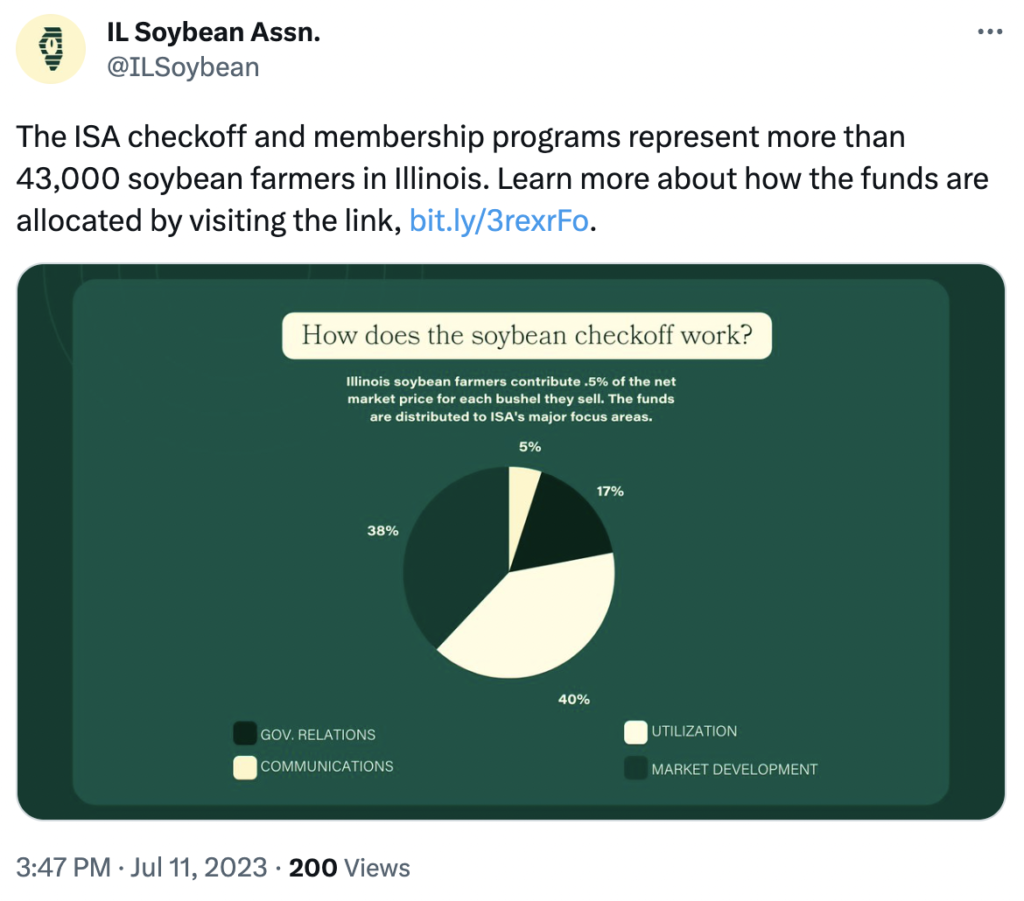Checkoff programs are banned from lobbying, yet in the past couple of weeks we’ve seen widespread instances of checkoff boards sponsoring, tweeting, and advertising messages that are clearly designed to influence government policy.
Checkoffs are mandatory taxes that farmers must pay when they sell any of 22 products including beef, soybeans, milk, and more. While checkoff dollars are meant to be used for product research and promotion — and have funded ad campaigns such as “Got Milk?” and “Beef. It’s What’s For Dinner.” — the lack of basic oversight over these programs has enabled them to become a corporate lobbying slush fund.
That’s why a large movement of more than 60 American farm organizations is supporting the bipartisan Opportunities for Fairness in Farming Act (OFF Act), which would specifically ban lobbying organizations from receiving any checkoff funds in the first place.
Here are just a few of the most recent checkoff lobbying violations:
Illinois Soybean Association
On July 11, the Illinois Soybean Association, a designated administrator of the federal soybean checkoff program, tweeted an explanation of how the soybean checkoff works: According to them, 17% of checkoff funds actually go to government relations. They claim checkoff dollars don’t fund policy work — yet “government relations” is defined as the process of influencing public policy at all levels of governance, i.e., lobbying.

Iowa Soybean Association
Then on July 17, the Iowa soy checkoff, another designated administrator of the federal soybean checkoff program, joined in by sponsoring a the Iowa Agribusiness Radio Network’s nightly news program, lending the checkoff brand to stories like one featuring Iowa Rep. Ashley Hinson promoting the China-friendly EATS Act, legislation opposed by 38 U.S. farm groups which would strip states’ rights. That’s right — the soy checkoff is using soybean farmers’ tax dollars to sponsor a newscast promoting legislation that would harm the very farmers forced to pay into the program.
On a related note, while the purpose of checkoffs is product research and promotion, a significant portion of these funds are used to buy advertisements in agriculture publications and newscasts like this one to promote the checkoffs to the very farmers and ranchers mandated to pay into the programs.

Specialty Crop Checkoff Boards
Recent checkoff lobbying activity isn’t limited to the soybean checkoff. On July 21st, Fruit Growers News reported that a coalition of seven specialty crop checkoff boards have endorsed a Congressional resolution meant to thwart checkoff program reform: “Groups signing the resolution include those that promote watermelons, potatoes, mangoes, mushrooms, Hass avocados, blueberries and pecans.” That’s a lot of checkoff boards blatantly skirting the law.

Missouri Soybean Checkoff
And here’s the kicker: checkoffs aren’t only engaging in rampant lobbying activity themselves, they’re also training others to “walk the halls” to influence government policy. The Missouri Soybean Association is currently running radio ads seeking applications for its “Policy Leaders Fellowship Cohort,” a checkoff-funded program that trains individuals on how to lobby. According to Morning Ag Clips, “In partnership with Iowa soybean growers, the program offers leadership training, networking opportunities, and hands-on work with policy, government and legislative processes.” And of course: “This educational program is possible thanks to support from Missouri soybean farmers and their checkoff.”

This ruse has gone on long enough. It’s time to crack down on checkoff programs that are breaking the law.
TAKE ACTION TO REFORM CORRUPT CHECKOFF PROGRAMS
Written and edited by: Angela Huffman, Joe Maxwell, Jessica Cusworth, and Dee Laninga

